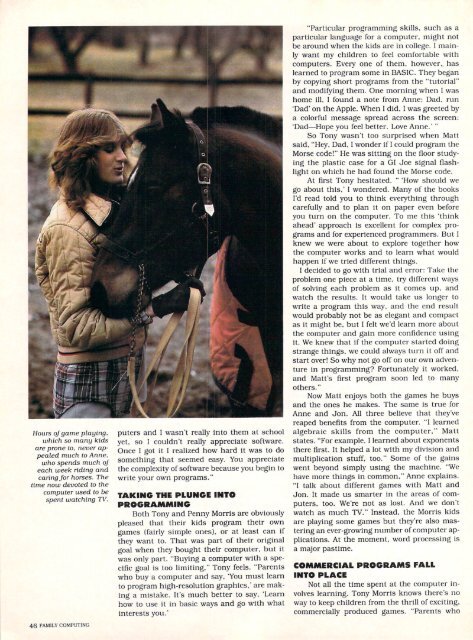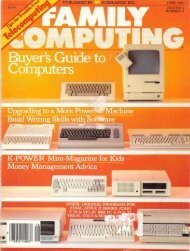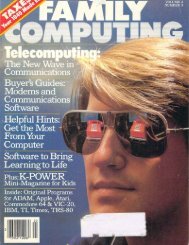The First 100 Days - Family Computing and K-Power Magazine ...
The First 100 Days - Family Computing and K-Power Magazine ...
The First 100 Days - Family Computing and K-Power Magazine ...
Create successful ePaper yourself
Turn your PDF publications into a flip-book with our unique Google optimized e-Paper software.
Hours of game playing,<br />
which so many kids<br />
are prone to. never ap<br />
pealed much to Anne,<br />
who spends much of<br />
each week riding <strong>and</strong><br />
caring for horses. <strong>The</strong><br />
time now devoted to the<br />
computer used to be<br />
spent watching TV.<br />
46 FAMILY COMPUTING<br />
puters <strong>and</strong> I wasn't really into them at school<br />
yet, so I couldn't really appreciate software.<br />
Once I got it 1 realized how hard it was to do<br />
something that seemed easy. You appreciate<br />
the complexity of software because you begin to<br />
write your own programs."<br />
TAKING THE PLUNGE INTO<br />
PROGRAMMING<br />
Both Tony <strong>and</strong> Penny Morris are obviously<br />
pleased that their kids program their own<br />
games (fairly simple ones), or at least can if<br />
they want to. That was part of their original<br />
goal when they bought their computer, but it<br />
was only part. "Buying a computer with a spe<br />
cific goal is too limiting," Tony feels. "Parents<br />
who buy a computer <strong>and</strong> say. 'You must learn<br />
to program high-resolution graphics," are mak<br />
ing a mistake. It's much better to say, 'Learn<br />
how to use it in basic ways <strong>and</strong> go with what<br />
interests you."<br />
"Particular programming skills, such as a<br />
particular language for a computer, might not<br />
be around when the kids are in college. I main<br />
ly want my children to feel comfortable with<br />
computers. Every one of them, however,, has<br />
learned to program some in BASIC. <strong>The</strong>y began<br />
by copying short programs from the "tutorial"<br />
<strong>and</strong> modifying them. One morning when I was<br />
home ill. I found a note from Anne: Dad. run<br />
'Dad' on the Apple. When I did. I was greeted by<br />
a colorful message spread across the screen:<br />
"Dad—Hope you feel better. Love Anne." "<br />
So Tony wasn't too surprised when Matt<br />
said. "Hey. Dad, 1 wonder if 1 could program the<br />
Morse code!" He was sitting on the floor study<br />
ing the plastic case for a GI Joe signal flash<br />
light on which he had found the Morse code.<br />
At first Tony hesitated. " 'How should we<br />
go about this." I wondered. Many of the books<br />
I'd read told you to think everything through<br />
carefully <strong>and</strong> to plan it on paper even before<br />
you turn on the computer. To me this 'think<br />
ahead' approach is excellent for complex pro<br />
grams <strong>and</strong> for experienced programmers. But I<br />
knew we were about to explore together how<br />
the computer works <strong>and</strong> to learn what would<br />
happen if we tried different things.<br />
I decided to go with trial <strong>and</strong> error: Take the<br />
problem one piece at a time, try different ways<br />
of solving each problem as it comes up, <strong>and</strong><br />
watch the results. It would take us longer to<br />
write a program this way, <strong>and</strong> the end result<br />
would probably not be as elegant <strong>and</strong> compact<br />
as it might be, but I felt we'd learn more about<br />
the computer <strong>and</strong> gain more confidence using<br />
it. We knew that if the computer started doing<br />
strange things, we could always turn it off <strong>and</strong><br />
start over! So why not go off on our own adven<br />
ture in programming? Fortunately it worked,<br />
<strong>and</strong> Matt's first program soon led to many<br />
others."<br />
Now Matt enjoys both the games he buys<br />
<strong>and</strong> the ones he makes. <strong>The</strong> same is true for<br />
Anne <strong>and</strong> Jon. All three believe that they've<br />
reaped benefits from the computer. "I learned<br />
algebraic skills from the computer," Matt<br />
states. "For example. I learned about exponents<br />
there first. It helped a lot with my division <strong>and</strong><br />
multiplication stuff, too." Some of the gains<br />
went beyond simply using the machine. "We<br />
have more things in common," Anne explains.<br />
"I talk about different games with Matt <strong>and</strong><br />
Jon. It made us smarter in the areas of com<br />
puters, too. We're not as lost. And we don't<br />
watch as much TV." Instead, the Morris kids<br />
are playing some games but they're also mas<br />
tering an ever-growing number of computer ap<br />
plications. At the moment, word processing is<br />
a major pastime.<br />
COMMERCIAL PROGRAMS FALL<br />
INTO PLACE<br />
Not all the time spent at the computer in<br />
volves learning. Tony Morris knows there's no<br />
way to keep children from the thrill of exciting,<br />
commercially produced games. "Parents who






